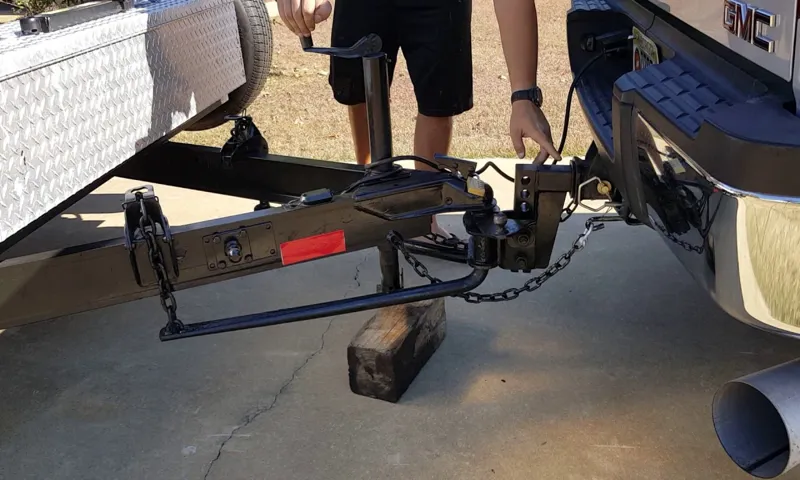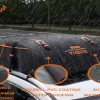Hey there, trailer enthusiasts! Are you tired of dealing with the sway and instability that comes with towing heavy loads? Well, we’ve got the perfect solution for you – the Equalizer Trailer Hitch. Imagine this: you’re on the road, cruising along with your trailer in tow, and suddenly, you hit a bump or a gust of wind. Your trailer starts swaying from side to side, making the driving experience nerve-wracking and dangerous.
It’s enough to make even the most experienced trailer owners break out in a cold sweat. But fear not! The Equalizer Trailer Hitch is here to save the day. This innovative towing system is designed to distribute the weight of your trailer evenly across all four tires of your vehicle, providing you with superior control and stability.
Think of the Equalizer Trailer Hitch as a superhero cape for your trailer. Just like a superhero can effortlessly navigate through any obstacle, this hitch system ensures that your trailer follows your every move, even when faced with challenging road conditions. Gone are the days of white-knuckle driving and praying that your trailer doesn’t take you for a wild ride.
With the Equalizer Trailer Hitch, towing becomes a breeze, giving you peace of mind and allowing you to enjoy the journey. So, whether you’re hauling a boat, a camper, or any other heavy load, the Equalizer Trailer Hitch is an essential tool that every trailer owner should have in their arsenal. Say goodbye to unstable towing and hello to a smoother, safer ride.
It’s time to take control of your trailer and hit the road with confidence. Get ready to experience the power of the Equalizer Trailer Hitch!
Table of Contents
What is an Equalizer Trailer Hitch?
An equalizer trailer hitch is a device that is designed to evenly distribute the weight of a trailer across the towing vehicle. When towing a trailer, the weight of the trailer can cause the front of the towing vehicle to lift up, impacting the handling and stability of the vehicle. This is especially important when towing heavy loads or when the trailer is larger than the towing vehicle.
An equalizer trailer hitch works by using a combination of weight distribution bars and a torsion spring system to redistribute the weight and keep the vehicle level. The weight distribution bars attach to the trailer hitch and are connected to the trailer’s frame. When the trailer is hooked up to the hitch, the weight of the trailer pushes down on the bars, which in turn compresses the torsion springs.
This compression helps to transfer some of the weight to the front axle of the towing vehicle, restoring balance and improving the handling and stability of the setup. Additionally, the equalizer trailer hitch also helps to reduce the amount of sway or rocking motion that can occur when towing a trailer, making for a safer and smoother driving experience. Overall, an equalizer trailer hitch is an essential tool for anyone who regularly tows heavy loads and wants to ensure the safety and stability of their vehicle and trailer combination.
How does an Equalizer Trailer Hitch work?
An equalizer trailer hitch is a key component in ensuring a smooth and stable towing experience. This innovative hitch system utilizes multiple points of connection to distribute the weight of the trailer evenly across the towing vehicle. While traditional hitches may cause the rear of the vehicle to sag due to the weight of the trailer, an equalizer hitch helps to level the vehicle by transferring some of the weight back onto the front wheels.
This not only improves the handling and control of the vehicle but also helps to prevent excessive wear and tear on the suspension, tires, and brakes. By evenly distributing the weight, an equalizer trailer hitch minimizes the risk of fishtailing or swaying, providing a safer and more comfortable towing experience for both the driver and their passengers. Whether you’re towing a small utility trailer or a larger RV, an equalizer hitch is a valuable tool that ensures your journey is both safe and enjoyable.

Understanding Weight Distribution
Equalizer trailer hitch Weight distribution is a crucial aspect of towing a trailer safely and comfortably. To achieve proper weight distribution, a trailer hitch called an Equalizer trailer hitch can be used. But how does it work? Essentially, an Equalizer trailer hitch is designed to distribute the weight of the trailer evenly across the axles of both the towing vehicle and the trailer.
This helps to prevent the trailer from swaying or sagging, and ensures that the weight is evenly distributed for better stability and control. The Equalizer hitch uses a set of spring bars that are attached to the trailer frame and the hitch head. These spring bars work to transfer some of the trailer’s weight to the front wheels of the towing vehicle.
By doing so, the Equalizer hitch helps to keep the front of the towing vehicle from being lifted and maintains a level ride. Additionally, the Equalizer hitch also helps to reduce the amount of sway that can occur when towing a trailer, making for a safer and more comfortable towing experience.
Balancing the Load
equalizer trailer hitch, balancing the load, tow vehicle, trailer sway, weight distribution, towing capacity, safety and stability, weight distribution bars An Equalizer Trailer Hitch is a valuable tool for anyone towing a heavy load. When you hook up a trailer to your tow vehicle, it can put a lot of strain on the back end of your vehicle. The weight of the trailer can cause the front of your vehicle to lift up, making it difficult to steer and reducing your overall control on the road.
Additionally, the weight of the trailer can cause it to sway from side to side, which is not only unnerving but also dangerous. This is where an Equalizer Trailer Hitch comes in. This type of hitch is designed to distribute the weight of the trailer evenly across all four wheels of your tow vehicle.
It uses weight distribution bars to help balance the load, keeping the vehicle level and stable. By ensuring that the weight is distributed properly, an Equalizer Trailer Hitch can help reduce trailer sway and increase safety and stability while towing.
Reducing Swinging and Swaying
Equalizer trailer hitches are designed to reduce swinging and swaying when towing a trailer. These hitches utilize a spring bar system that distributes the weight evenly between the trailer and the towing vehicle, creating a more stable and controlled towing experience. When a trailer is attached to a vehicle, it can create a “pendulum effect” where the trailer swings and sways side to side, especially when encountering bumps or crosswinds.
This can be not only dangerous but also uncomfortable for the driver. The equalizer hitch works by transferring the weight from the trailer’s tongue to the front axle of the towing vehicle, which helps to level the vehicle and reduce the chances of swinging and swaying. The spring bars in the hitch system provide tension and resistance to counteract the forces that contribute to swinging and swaying.
This allows for a smoother and safer towing experience, giving the driver more control and stability on the road. So, if you’re planning to tow a trailer and want to minimize swinging and swaying, an equalizer trailer hitch is a great investment.
Improving Stability and Control
Equalizer Trailer Hitch, stability, control, towing, weight distribution, sway control, towing capacity An Equalizer Trailer Hitch is a device designed to improve the stability and control of a towing vehicle when hauling heavy loads. It is a vital tool for anyone who regularly tows trailers or other heavy equipment. The primary role of an Equalizer Trailer Hitch is to evenly distribute the weight of the trailer across all axles of the towing vehicle, reducing the strain on the rear axle and improving stability while towing.
This is achieved through a series of spring bars that connect the trailer to the towing vehicle. These spring bars help to evenly distribute the weight and keep the trailer level, minimizing the risk of a trailer becoming unbalanced and causing a loss of control. In addition to weight distribution, an Equalizer Trailer Hitch also features sway control technology.
Sway control helps to mitigate the effects of crosswinds or sudden movements of the trailer, reducing swaying and improving overall control of the towing vehicle. Ultimately, an Equalizer Trailer Hitch is a valuable tool that enhances the towing experience by improving stability, control, and safety.
Benefits of Using an Equalizer Trailer Hitch
An equalizer trailer hitch is a device that helps distribute the weight of a trailer evenly across the towing vehicle and trailer wheels. It works by using tensioned bars to transfer some of the weight from the trailer tongue to the front axle of the towing vehicle and the trailer’s axles. This helps to improve stability and control while towing, especially when dealing with heavy loads or uneven terrain.
By balancing the weight between the trucks’ axles and the trailer’s axles, an equalizer hitch reduces sway and bounce, allowing for a smoother and safer towing experience. Whether you’re hauling a boat, RV, or utility trailer, using an equalizer trailer hitch can significantly improve the performance and safety of your towing setup.
Improved Towing Performance
equalizer trailer hitch, improved towing performance, benefits
Safer and More Stable Towing Experience
equalizer trailer hitch. When it comes to towing, safety is always a top priority. That’s why using an equalizer trailer hitch can make a significant difference in your towing experience.
This type of hitch is designed to distribute the weight of the trailer evenly across the axles of the tow vehicle, resulting in a safer and more stable ride. One of the key benefits of using an equalizer trailer hitch is improved weight distribution. Traditional hitches cause the weight of the trailer to be concentrated on the rear axle of the tow vehicle.
This can lead to an imbalance, causing the rear of the vehicle to sag and the front end to lift. With an equalizer hitch, the weight is distributed more evenly, which helps to maintain proper balance and prevent these issues. Another advantage of an equalizer trailer hitch is reduced sway.
Sway or fishtailing can occur when the trailer starts to sway from side to side, making it difficult to control. This can be caused by strong winds, uneven road surfaces, or sudden maneuvers. An equalizer hitch helps to minimize sway by distributing the weight of the trailer more effectively, providing a more stable towing experience.
Additionally, using an equalizer trailer hitch can also improve braking performance. When the weight of the trailer is properly distributed, it allows for better traction between the tires and the road. This means that your brakes will be more effective, allowing you to stop safely and quickly when needed.
Overall, investing in an equalizer trailer hitch is a smart choice for anyone who frequently tows trailers. It not only improves safety but also enhances stability and control. With better weight distribution, reduced sway, and improved braking performance, you can have peace of mind knowing that you are towing with confidence.
Reduced Wear and Tear on Vehicle and Trailer
equalizer trailer hitch, reduced wear and tear on vehicle and trailer Using an equalizer trailer hitch comes with numerous benefits, and one of the most significant advantages is the reduced wear and tear on both your vehicle and trailer. With a typical hitch, the weight of the trailer tends to sit on the rear axle of the towing vehicle, causing increased strain on the suspension and tires. This can lead to premature wear and a decreased lifespan of these components.
However, an equalizer trailer hitch redistributes the weight more evenly between the vehicle and trailer, resulting in a smoother and more balanced towing experience. By reducing the strain on the suspension and tires, it helps to minimize the likelihood of damage and prolong the overall durability of your vehicle and trailer. Additionally, the equalizer hitch can dampen the forces exerted by the trailer, further reducing the wear and tear on both vehicles.
So if you want to protect your investment and ensure a safer and more efficient towing experience, using an equalizer trailer hitch is definitely worth considering.
Choosing the Right Equalizer Trailer Hitch
An equalizer trailer hitch is a crucial component when it comes to towing heavy loads. But how does it actually work? Well, imagine you’re at a seesaw with a much heavier person on one side. Without any assistance, it’s going to be pretty difficult for you to lift up the heavier person.
Similarly, when you’re towing a trailer, the weight distribution can be uneven, with most of the weight sitting on the rear of your vehicle. This can cause the front of your vehicle to lift and the rear to sag, compromising stability and control. That’s where an equalizer trailer hitch comes in.
It consists of a hitch receiver, a weight distribution system, and sway control mechanisms. The weight distribution system involves spring bars that attach to both the trailer and your vehicle. These bars help distribute the trailer’s weight more evenly between the axles of your vehicle, allowing the front of your vehicle to stay level and ensuring a safer and more comfortable towing experience.
Additionally, an equalizer trailer hitch also addresses the issue of trailer sway. Sway control mechanisms, such as friction sway control or dual-cam sway control, are integrated into the hitch to minimize the side-to-side movement of the trailer. This helps maintain stability and prevents any fishtailing that could occur while towing.
Overall, an equalizer trailer hitch is essential for maintaining proper weight distribution and stability when towing heavy loads. It ensures that your vehicle remains level and in control, providing you with a safer and more enjoyable towing experience. So, next time you’re hitting the road with a trailer in tow, make sure you have the right equalizer trailer hitch to keep everything balanced.
Weight Capacity and Compatibility
equalizer trailer hitch
Type of Trailer and Towing Setup
equalizer trailer hitch. Choosing the right equalizer trailer hitch is crucial when it comes to towing a trailer. This type of hitch is designed to distribute the weight of the trailer evenly across all axles, which helps to improve stability and control while towing.
It uses a combination of weight distribution and sway control mechanisms to ensure a smooth and safe towing experience. There are a few factors to consider when choosing the right equalizer trailer hitch for your towing setup. First, you need to determine the weight capacity of your trailer and make sure that the hitch you choose can handle that weight.
It’s also important to consider the type of trailer you’ll be towing. If you’ll be towing a heavy trailer, such as a boat or RV, you’ll need a heavy-duty equalizer trailer hitch that can handle the extra weight. Another important factor to consider is the size of the trailer hitch receiver on your towing vehicle.
The receiver size will determine the size of the equalizer hitch shank that you’ll need. It’s important to choose a hitch that is compatible with your receiver size to ensure a secure and stable connection between your towing vehicle and the trailer. Additionally, consider the ease of installation and adjustment when choosing an equalizer trailer hitch.
Look for a hitch that is easy to install and that allows for adjustments to be made easily. This will make it much more convenient for you to set up and adjust the hitch as needed when towing different trailers. In conclusion, choosing the right equalizer trailer hitch is essential for safe and stable towing.
Consider the weight capacity, trailer type, receiver size, and ease of installation and adjustment when making your decision. By selecting the right hitch for your towing setup, you can ensure a smooth and secure towing experience.
Features and Adjustability
Equalizer trailer hitch
Conclusion
In conclusion, the equalizer trailer hitch is like the superhero of towing. It swoops in and saves the day, ensuring that your trailer and vehicle form the ultimate crime-fighting duo on the road. With its intricate system of springs and bars, it helps to distribute the weight evenly between the two, preventing any unbalanced situations that could lead to disaster.
Think of it as the dance partner that keeps your towed load and vehicle in sync, gliding and twirling effortlessly down the highway. Just like a skilled choreographer, the equalizer trailer hitch knows how to balance the weight, eliminating any jerky movements or wobbles that could throw off your entire performance. So, the next time you’re hitching up a trailer and contemplating the mysteries of weight distribution, remember that the equalizer trailer hitch is there to save the day.
It’s the unsung hero that keeps your load stable, your rides smooth, and your towing experience a breeze. Trust in the power of equalization and let this marvelous contraption do the heavy lifting for you. Happy towing, my friends!”
FAQs
How does an equalizer trailer hitch work?
An equalizer trailer hitch works by evenly distributing the weight of the trailer across all axles, using spring bars and tension adjustment. This helps improve stability, control, and handling while towing.
What are the benefits of using an equalizer trailer hitch?
Using an equalizer trailer hitch provides several benefits, including improved towing stability, reduced trailer sway and bouncing, better weight distribution, increased safety, and enhanced control and handling.
Can an equalizer trailer hitch be used with different trailer weights?
Yes, an equalizer trailer hitch can be adjusted to accommodate different trailer weights by adjusting the tension on the spring bars. This allows for proper weight distribution and a level towing experience regardless of the trailer weight.
How do I choose the right equalizer trailer hitch for my towing needs?
To choose the right equalizer trailer hitch, consider your trailer weight and tongue weight, as well as your towing vehicle’s towing capacity. It’s also important to evaluate the brand reputation, customer reviews, and any additional features or accessories that may be beneficial for your specific towing needs.
Are there any maintenance requirements for an equalizer trailer hitch?
Yes, regular maintenance is recommended for an equalizer trailer hitch. This may include greasing the hitch components, inspecting and adjusting the tension on the spring bars, and ensuring all bolts and connections are secure. It’s important to follow the manufacturer’s guidelines for maintenance to ensure optimal performance and safety.
Can an equalizer trailer hitch be installed on any type of trailer?
An equalizer trailer hitch can be installed on most types of trailers, including travel trailers, utility trailers, boat trailers, and enclosed trailers. However, it’s important to verify the compatibility of the hitch with your specific trailer before installation.
Are there any specific safety considerations when using an equalizer trailer hitch?
When using an equalizer trailer hitch, it’s important to ensure that the hitch components are properly installed and securely attached. Regularly inspect the hitch and its components for any signs of wear or damage. Additionally, follow safe towing practices, such as checking tire pressure, properly loading the trailer, and obeying weight limits and speed limits.
Can an equalizer trailer hitch help reduce trailer sway? A8. Yes, an equalizer trailer hitch can help reduce trailer sway by evenly distributing the weight of the trailer across all axles. This improves stability and control, reducing the likelihood of trailer sway caused by wind gusts, passing vehicles, or uneven road surfaces.
Are there different types of equalizer trailer hitches available?
Yes, there are different types of equalizer trailer hitches available, including round bar hitches and trunnion bar hitches. Each type has its own advantages and is designed to accommodate different trailer weights and towing setups.
Can an equalizer trailer hitch improve fuel efficiency while towing?
An equalizer trailer hitch can contribute to improved fuel efficiency while towing by ensuring a more balanced weight distribution, reducing drag, and providing better control and stability. However, other factors such as driving habits, terrain, and overall weight will also impact fuel efficiency.



